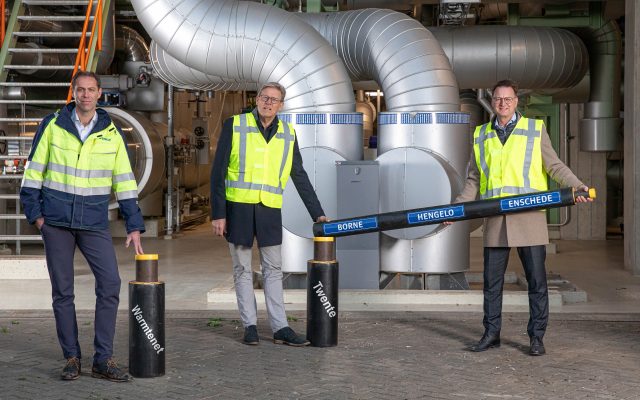The Twente region is looking for ways to heat homes and other buildings without natural gas. This is a huge task that requires all available heat sources. In addition, the infrastructure must be suitable to provide the heat. The municipalities of Borne, Enschede and Hengelo, together with the waste management company Twence, are focusing on a feasibility study of a regional heat network to make the best use of the heat sources. The parties signed a memorandum of understanding to study this feasibility. The results of this study are expected to be available by the end of 2022.
Heating buildings without natural gas is one of the challenges of the National Climate Agreement to help reduce CO2 emissions. Tijs de Bree, MP for the province of Overijssel, is pleased with this declaration of intent: “The regional heating network is a great opportunity to comply with the climate agreements in Overijssel. I am excited about the exploration, which has shown that it makes sense to take the next steps. I am confident that the municipalities and Twente will now step on the gas together and achieve results.”
The exploration is an important step in the energy transition for Twente. The Twente Regional Energy Strategy (RES) aims to connect existing heat networks and develop new heat networks. “It is a complex task to supply buildings in Twente with natural gas-free heat,” says Louis Koopman of RES Twente. “We need to match supply and demand well. And we urgently need all the sources that are available to avoid having to generate more electricity sustainably to heat buildings. A good future-oriented infrastructure makes the difference, because with it we make the connection, we bring the heat home and we make sure it is feasible and affordable. A regional heat network in urban areas can contribute to that.”
In Twente, a lot of heat is available from industry, for example. Twence generates heat from non-recyclable waste wood (from construction, demolition and bulky household waste) and household residual waste. The amount of heat available is currently insufficiently used efficiently because it is used to generate electricity. There is heat available that Twence can use intelligently for the region’s residents. Twence uses multiple sources to generate heat and is therefore always available. With these heat sources we can heat more than 100,000 buildings, in addition to the homes and buildings in Twente that are already supplied with heat from Twence,” says Marc Kapteijn, director of twence. “We are aiming for an open network so that in the long term we can connect other sustainable heat sources that are not yet available. Think, for example, of heat from the ground (geothermal energy) or from industrial processes.”
Feasibility studies
The initial exploration shows that a regional heat network can contribute to a better use of available heat sources. In this case, less electricity is needed to heat homes and other buildings that would otherwise have to be generated sustainably via wind or solar energy. In this feasibility study, the municipalities of Borne, Enschede and Hengelo, together with Twence, are investigating whether the available heat can be used sustainably, cost-effectively and reliably to heat buildings. Based on this research, it will also become clear whether a regional heating network can be extended to surrounding municipalities in the long term.
Cooperation
The cooperation of all partners involved and agreements with large business customers are prerequisites for the success of a heating network. Twence therefore also works intensively with Cogas and Ennatuurlijk, because these locally based parties bring a lot of knowledge that is important in this research. Housing associations are also important players in this context. The municipalities of Borne, Enschede and Hengelo involve their residents in the research to explore the possibilities of a regional heating network.
